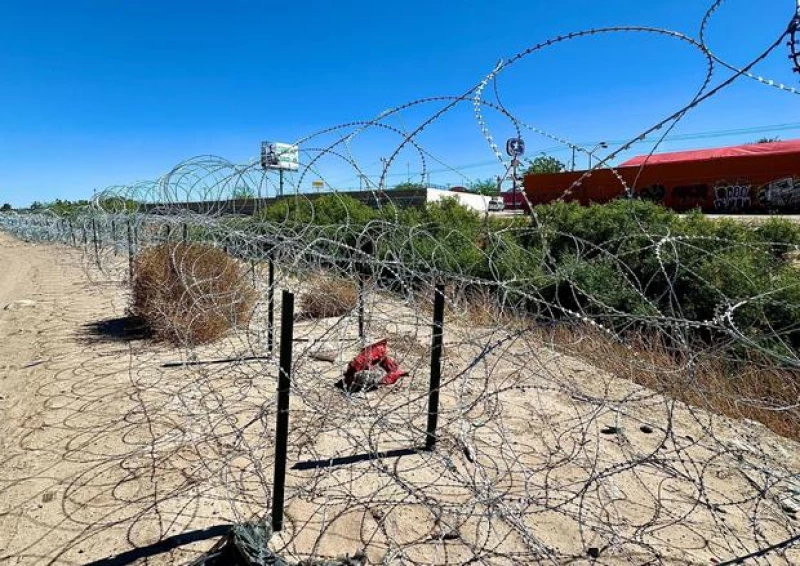Ciudad Juárez, Mexico — Desperate and exhausted, the migrants gathered around a tree that offered them some shade from the unforgiving sun.
They had traveled from countries throughout Latin America, including Colombia, the Dominican Republic, Ecuador, Guatemala, Honduras, Peru and Venezuela. Some of them were parents traveling with small children, including toddlers. Others were young men. Some of the teenagers appeared to be unaccompanied minors traveling without their parents.
All of them shared a common goal: entering the U.S., which was just a few yards away. But standing in their way were miles of razor wire and other barriers erected by the state of Texas at the direction of Gov. Greg Abbott to deter migrants from crossing into the U.S. illegally.
"They're trying to kill us," one of the migrant men said in Spanish, showing CBS News cameras how sharp the wire could be.
Some said they had tried to get past the barriers several times to no avail. At one point, the migrants huddled around the cameras to describe the austere conditions in the makeshift camp they had set up near the U.S. border with tents and blankets.
Desperate Migrants Brave Harsh Conditions
A group of migrants, including women and children, have been camping near a tree for days, enduring the harsh elements in the hopes of entering the U.S. One Venezuelan woman, carrying a small child, expressed their dire situation in Spanish, saying, "We don't have food. We don't have water."
Rene, a migrant from Honduras, shared that he has been sleeping outside for 15 days with his young daughters, ages 3 and 9. They use blankets to stay warm during the cold nights and mornings, sleeping in an area filled with brushes.
"I don't sleep the entire night," Rene mentioned in Spanish, explaining that he stays awake to ensure his daughters' safety.
Decline in Illegal Crossings
Despite the challenging conditions faced by migrants, illegal crossings along the U.S. southern border have decreased by over 40% this year compared to the record levels seen in December. In April, around 129,000 unlawful crossings were recorded by U.S. Border Patrol, marking the second consecutive monthly decline, as per preliminary government data obtained by CBS News. This trend is unusual, as migration typically increases in the spring.
However, despite the drop in illegal crossings, tens of thousands of migrants remain in Mexico, particularly in places like Ciudad Juárez, where shelter space is limited, and living conditions can be dire.
Many in Mexico are waiting to secure an appointment to enter the U.S. at an official port of entry through a Biden administration program powered by a smartphone app known as CBP One. But the process is capped at 1,500 spots each day. And the demand in Mexico is far higher.
Facing wait-times that often extend for months, some migrants, like the ones in the makeshift encampment, grow desperate and decide to try to cross into the U.S. illegally. But they first have to make it past the Texas barriers to surrender to federal Border Patrol agents, the initial step in the years-long asylum process.

Karina Breceda, who oversees migrant shelters in Ciudad Juárez and El Paso, called the barricades set up by Texas "inhumane," noting she has helped some migrants, including children, who were cut by the razor wire.
"The U.S. is the greatest country in the world," Breceda said. "We're able to have, I think, policy that treats this situation with dignity."
But on the U.S. side of the border, Texas Department of Public Safety Sergeant Eliot Torres said the wire is supposed to serve as a "sign" warning migrants not to enter the U.S. between official ports of entry, which is a federal crime. Texas has also sought to make the act a state crime through a law known as SB4, but federal courts have blocked the measure at the request of the Biden administration.
"The inhumane part is in … the optic, right?" Torres said near a stretch of the border near El Paso that Texas has fortified with razor wire and additional fencing. "That's what people perceive it to be."
Torres acknowledged migrants could be cut by the wire. Asked if that's part of the deterrence objective, he said, "Yes." But Torres noted that Texas officials provide medical aid to migrants who sustain injuries or who are otherwise in distress.
"We're here protecting our border, but also we're not going to … just let somebody stand there, have an injury," Torres said.
Abbott and other Texas officials have credited their actions — from the razor wire, to arrests of migrants on state trespassing charges — for the marked decline in migrant crossings in recent months, which has been more acute in the Lone Star State than in Arizona and California.
But federal officials believe the main catalyst is an aggressive crackdown on U.S.-bound migrants by Mexican officials, who have ramped up efforts to stop migrants from boarding trains and buses that would take them closer to the American border. They're also deporting some migrants to southern Mexico.
Still, some migrants like Rene have made it to northern Mexico despite the crackdown, and are willing to wait indefinitely for a chance to make it to the U.S.
"We came searching for the American dream," he said.






